Creatine Beyond Muscles: How It Supports Mental Sharpness
Introduction
When you hear the word creatine, you probably think of gym-goers and muscle growth. But did you know this powerhouse compound also fuels your brain? 🧠⚡
Beyond its reputation as a sports supplement, creatine is emerging as one of the most promising nutrients for mental energy, cognitive resilience, and stress management. From students pulling all-nighters to professionals juggling high workloads, creatine might be the key to staying sharp when your brain is running on empty.
Let’s explore how this simple molecule boosts both mental and physical performance, how it works inside your neurons, and how to combine it with breathwork and therapy for full-spectrum brain support.
Looking for supplements for Brain Fog? Click here.
🧬 What Is Creatine, Really?

Creatine is a naturally occurring compound made from the amino acids arginine, glycine, and methionine. Your body produces it in the liver, kidneys, and pancreas, and stores most of it in your muscles and brain as phosphocreatine.
While it’s best known for increasing muscle strength and endurance, about 20% of your body’s creatine is found in your brain, where it serves a different — but equally vital — purpose:
⚡ Fueling neurons for focus, learning, and decision-making.
In short: Creatine is not just for lifting weights — it’s for lifting mental load.
⚙️ How Creatine Fuels the Brain
To stay sharp, your brain needs enormous amounts of energy — nearly 20% of your body’s total ATP (adenosine triphosphate). ATP is the “energy currency” that powers every thought, memory, and movement.
But here’s the catch: your brain doesn’t store much ATP. It needs a backup energy system, and that’s where creatine comes in.
🧠 The Creatine–Phosphocreatine System
Creatine works like a battery pack for your brain cells. When neurons run low on ATP during intense mental activity, phosphocreatine donates a phosphate group to regenerate ATP instantly.
This means:
✅ Faster thinking under stress
✅ Less mental fatigue
✅ Better short-term memory and focus
In other words, creatine gives your brain the same endurance boost it gives your muscles — but instead of lifting weights, it’s lifting thoughts.
🧩 The Science: Creatine and Cognitive Function
Research over the last two decades has shown that creatine supplementation can significantly improve memory, attention, and executive function, especially under stress or sleep deprivation.
🔬 Key Studies:
Cambridge University (2003): Participants who took 5 g/day of creatine for six weeks showed improved working memory and intelligence test scores compared to placebo.
University of Sydney (2008): Vegetarians who supplemented with creatine showed better short-term memory and mental fatigue resistance — likely due to lower baseline creatine levels.
Military Research (2010): Creatine enhanced reaction times and focus in sleep-deprived soldiers.
💡 Creatine acts as cognitive insurance — ensuring your brain has energy reserves when life gets demanding.
⚡ Cognitive Benefits of Creatine
Let’s break down how creatine helps you stay mentally sharp in different scenarios.
🧠 Improved Memory and Recall
Creatine supports the hippocampus — the brain’s memory center — by providing steady ATP during learning and recall.
Perfect for: students, professionals, or anyone who wants sharper mental retention.
💭 Faster Mental Processing
During complex problem-solving, neurons fire rapidly and consume huge amounts of ATP. Creatine helps maintain firing efficiency, reducing cognitive slowdown during demanding tasks.
🧩 Mental Endurance Under Stress
When stress depletes your brain’s energy, creatine acts as a buffer, keeping neurotransmitter synthesis stable. This prevents the “crash” that often follows long periods of focus.
😴 Protection Against Sleep Deprivation
Studies show that creatine reduces mental fatigue and reaction time decline during sleep loss — making it ideal for shift workers, entrepreneurs, or parents running on little rest.
💪 Creatine for Mood, Motivation, and Mental Resilience
Creatine doesn’t just help with energy — it may also support emotional regulation and mood stability.
Low brain energy is linked to depression and anxiety, and creatine helps by enhancing mitochondrial efficiency and balancing neurotransmitters like serotonin and dopamine.
📚 Evidence Snapshot:
American Journal of Psychiatry (2012): Women with depression showed improved mood when taking creatine alongside SSRIs.
Biological Psychiatry (2019): Creatine increased brain phosphocreatine levels, correlating with reduced anxiety and better motivation.
🌿 By boosting cellular energy, creatine helps your mind handle emotional stress with greater resilience.
🧬 The Brain–Muscle Connection
The mind and body are deeply linked — and creatine bridges both worlds.
Better brain energy → better focus during workouts.
Better physical endurance → more oxygen and nutrient delivery to the brain.
This synergy explains why many athletes report not just better performance, but also greater mental clarity after consistent creatine use.
💊 How to Take Creatine for Cognitive Benefits
Creatine is one of the most researched, safe, and affordable supplements on the market.
✅ Recommended Dosage:
Daily dose: 3–5 grams per day
Loading (optional): 20 g/day for 5 days, then 5 g/day for maintenance
Form: Creatine monohydrate (most studied and effective)
Timing: Anytime — consistency matters more than timing
Take it with water or a carbohydrate source to enhance absorption.
⚠️ Note for Vegetarians/Vegans:
Since creatine is found mainly in animal foods (meat, fish), plant-based individuals often have lower baseline brain creatine levels — and therefore, may experience even greater benefits from supplementation.
🌿 Natural Food Sources of Creatine
| Food | Creatine (g per kg) |
|---|---|
| Beef | 4.5 |
| Salmon | 4.0 |
| Pork | 5.0 |
| Chicken | 3.5 |
| Tuna | 4.0 |
However, you’d need to eat several pounds of meat daily to reach the 5-gram effective dose — which is why supplementation is much more practical.
🔋 Mitochondria and Mental Energy
Your mitochondria are the “power plants” of your brain. They produce ATP — and creatine acts as their energy stabilizer.
By keeping ATP levels consistent, creatine prevents mental burnout and supports long-term neuronal health.
🧬 Think of creatine as an energy safety net — catching your brain when it starts to run out of fuel.
🌬️ Breathwork + Creatine: Oxygen and Energy
Creatine enhances energy storage, but oxygen intake determines how efficiently you can use that energy.
Deep, intentional breathing increases oxygen delivery to brain cells, improving ATP production and mental calm.
Try This: “Brain Recharge Breath”
Inhale deeply through your nose for 5 seconds
Hold for 3 seconds
Exhale slowly through your mouth for 7 seconds
Repeat for 2–3 minutes
🌬️ Combine this breathwork with daily creatine to fuel your brain with both oxygen and phosphate energy — the perfect formula for clarity.
Want to try Breathwork? Click Here.
🧘 Therapy and Mental Clarity

While creatine enhances brain chemistry, therapy enhances mental architecture — how you process and organize thoughts.
Chronic stress, anxiety, or perfectionism can cloud thinking regardless of energy levels.
Therapy (especially CBT or mindfulness-based approaches) helps by:
Reframing unproductive thoughts
Reducing cognitive load
Improving emotional flexibility
Creatine supports the biochemical side of clarity; therapy supports the psychological side. Together, they create lasting mental resilience.
🧩 A fueled brain plus a calm mind = unstoppable focus.
Looking for online therapy ? Click Here.
💭 Creatine and Brain Aging
Cognitive decline is often linked to reduced ATP and mitochondrial dysfunction. Creatine helps preserve both.
Long-term supplementation has been shown to:
Improve memory recall in older adults
Enhance muscle–brain coordination
Slow age-related cognitive fatigue
This makes creatine one of the few supplements that benefits both mental and physical longevity.
⚖️ Safety and Side Effects
Creatine is one of the safest supplements ever studied — used by millions worldwide.
✅ Safe For:
Men and women of all ages
Vegans and vegetarians
Long-term daily use
⚠️ Mild Effects (rare):
Temporary water retention (in muscles, not fat)
Mild bloating (if loading too fast)
Stay hydrated, and skip the “loading phase” if sensitive.
🧩 Stacking Creatine with Other Nootropics
For even greater cognitive support, combine creatine with synergistic brain nutrients:
| Supplement | Benefit |
|---|---|
| Rhodiola Rosea | Reduces stress and improves stamina |
| L-Tyrosine | Boosts dopamine for focus and alertness |
| Magnesium Threonate | Calms overactive neurons |
| Omega-3s (DHA/EPA) | Supports neuron membrane fluidity |
| CoQ10 | Enhances mitochondrial energy |
| B-Complex Vitamins | Boosts neurotransmitter synthesis |
Together, they create a mental performance stack that supports both clarity and calm.
🧘 Creatine and Stress Resilience
Your brain consumes the most energy during stress. The more pressure you’re under, the more ATP you burn.
Creatine ensures your brain never runs out of fuel during demanding moments — presentations, deadlines, exams, or emotional challenges.
Paired with breathwork and adaptogens like Rhodiola, it helps you stay focused without feeling frazzled.
🌈 The Role of Sleep in Creatine’s Effectiveness
Sleep is when your brain restores energy reserves and clears out waste via the glymphatic system.
Creatine complements sleep by keeping neurons well-fueled during the day — but don’t skip rest!
💤 Combine 5 g creatine daily with:
Magnesium glycinate (300 mg)
L-Theanine (200 mg)
Consistent bedtime routine
Sleep deep, think clear. 🌙
🧘 A Daily Routine for Mental Sharpness
| Time | Action | Purpose |
|---|---|---|
| ☀️ Morning | 5 g creatine + breakfast | Boosts baseline brain energy |
| 🌬️ Midday | 3 min breathwork | Recharges focus |
| 🧠 Afternoon | Light movement + hydration | Enhances blood flow |
| 🌙 Night | Therapy/journaling + magnesium | Emotional recovery |
Consistency matters more than timing — over weeks, your brain’s “energy baseline” rises steadily. ⚡
⚡ Common Myths About Creatine
🚫 Myth 1: Creatine is only for bodybuilders.
✅ Reality: It benefits everyone — including students, professionals, and older adults.
🚫 Myth 2: It causes kidney damage.
✅ Reality: Decades of research show no harm in healthy individuals at standard doses.
🚫 Myth 3: It makes you gain fat.
✅ Reality: It causes mild water retention in muscles — not fat gain.
🧬 The Future of Creatine Research
Scientists are now exploring creatine’s potential in:
Neurodegenerative diseases like Alzheimer’s and Parkinson’s
Depression and anxiety management
Post-concussion recovery
Sleep-deprived performance optimization
As research expands, creatine may become as essential for brain health as it is for athletic performance.
🧩 Key Takeaways
✅ Creatine fuels both body and brain with fast, stable energy.
✅ Enhances memory, focus, and stress resilience.
✅ Ideal dosage: 3–5 g daily (creatine monohydrate).
✅ Combine with breathwork, therapy, and sleep for full mental optimization.
✅ Safe, affordable, and effective for long-term use.
🌟 Final Thoughts
Creatine isn’t just a gym supplement — it’s a brain performance enhancer hiding in plain sight.
By keeping your neurons fueled and your mind focused, it helps you stay clear, confident, and energized — whether you’re lifting weights, solving problems, or managing stress.
When paired with breathwork, therapy, and sleep, creatine becomes part of a holistic approach to mental sharpness, emotional resilience, and long-term cognitive vitality.
✨ Creatine isn’t about adding bulk — it’s about adding brilliance.
📚 References
Rae C, et al. “Oral creatine monohydrate supplementation improves brain performance.” Proc Biol Sci. 2003;270(1529):2147–2150.
McMorris T, et al. “Creatine supplementation and cognitive performance.” Amino Acids. 2007;33(1):63–73.
Allen PJ. “Creatine supplementation and brain function.” Neurochem Int. 2012;60(4):451–458.
Avgerinos KI, et al. “Effects of creatine supplementation on cognitive function.” Exp Gerontol. 2018;108:166–173.
Lyoo IK, et al. “Creatine supplementation enhances antidepressant response.” Am J Psychiatry. 2012;169(9):937–945.
Streeter CC, et al. “Breathwork and brain oxygenation.” J Altern Complement Med. 2012;18(5):402–412.
Related Posts
-
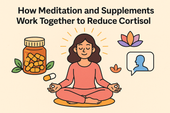
How Meditation and Supplements Work Together to Reduce Cortisol: A Complete Guide to Calming the Mind and Body
Meditation and supplements can work hand in hand to naturally reduce cortisol, your body’s main stress hormone. 🌿 Learn how mindfulness practices, adaptogenic herbs, and nutrient support like magnesium, omega-3s, and B vitamins create a powerful synergy for calm, focus, and emotional balance—backed by science and daily rituals that truly reset your stress response.
-
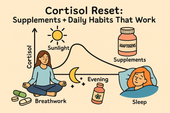
Cortisol Reset: Supplements + Daily Habits That Work
-
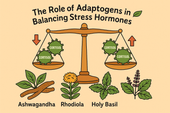
The Role of Adaptogens in Balancing Stress Hormones
Adaptogens work at the root of stress — your nervous system. 🌿 Learn how these powerful herbs help regulate cortisol, calm your nerves, and restore balance between energy and relaxation. ✨
-
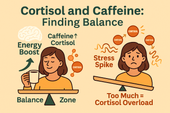
Cortisol and Caffeine: How Much Is Too Much?
Caffeine can boost energy and focus — but too much can overstimulate your stress hormones. ☕ Learn how caffeine affects cortisol, energy levels, and mood, and discover how to find the perfect balance for lasting calm and clarity. 🌿
-
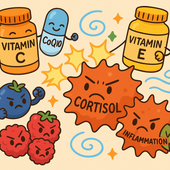
Antioxidants for Stress Management and Cortisol Control
When stress overwhelms your body, antioxidants come to the rescue. 🌿 Learn how vitamin C, CoQ10, and other natural compounds help reduce oxidative stress, regulate cortisol, and restore calm energy from within. ✨
-
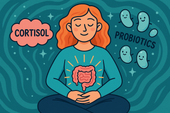
Cortisol and Gut Health: How Probiotics May Help
Chronic stress doesn’t just affect your mind — it changes your gut. 🌿 Learn how cortisol disrupts the microbiome and how probiotics can help restore balance, improve digestion, and calm your stress response naturally. ✨
-

Vitamin D and Cortisol: Supporting Immune Balance
Vitamin D does more than strengthen bones — it helps regulate cortisol and support immune balance. 🌞 Learn how this essential hormone-like nutrient restores calm, improves mood, and strengthens your body’s natural stress defenses. 🌿
-
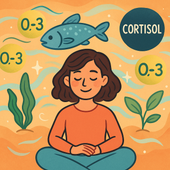
Omega-3s and Cortisol: Fighting Inflammation Naturally
Omega-3s are more than heart-healthy fats — they’re natural cortisol regulators. 🌿 Learn how EPA and DHA help reduce chronic inflammation, calm the nervous system, and support stress recovery from the inside out. ✨
-
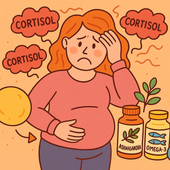
High Cortisol and Belly Fat: Can Supplements Help?
Chronic stress can make belly fat harder to lose — but supplements like ashwagandha, magnesium, and omega-3s may help restore cortisol balance. 🌿 Learn how science-backed nutrients support fat metabolism, calm your stress response, and bring your body back into harmony. ✨
-
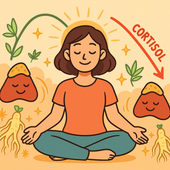
How Ginseng Can Support Energy and Cortisol Balance
Ginseng is one of nature’s most powerful adaptogens, helping your body handle stress without burning out. 🌿 Learn how this ancient root supports balanced cortisol, steady energy, and sharper focus — restoring vitality naturally and sustainably. ✨
-
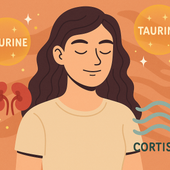
Taurine and Cortisol: Supporting Focus Under Stress
When cortisol surges, focus fades — but taurine helps restore balance. 🌿 Learn how this powerful amino acid calms your nervous system, regulates stress hormones, and sharpens concentration without jitters or fatigue. ✨
-
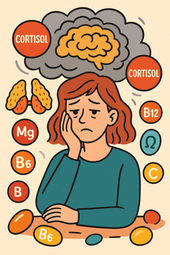
The Link Between Cortisol, Brain Fog, and Nutrient Deficiencies
When brain fog sets in, it’s not just in your head — it’s in your hormones. 🌿 Discover how cortisol imbalance and nutrient deficiencies like low magnesium, B vitamins, and omega-3s can cloud your focus and how restoring balance brings back mental clarity and calm. ✨
-
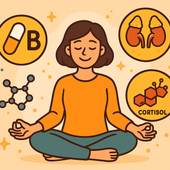
B Vitamins for Stress, Energy, and Cortisol Regulation
B vitamins are the foundation of stress resilience and steady energy. 🌿 Learn how this essential group of nutrients helps regulate cortisol, restore focus, and keep your nervous system calm — giving you balance from the inside out. ✨
-

Cortisol Imbalance and Chronic Fatigue: Can Supplements Help?
When chronic stress keeps cortisol high, fatigue and brain fog follow. 🌿 Learn how to rebalance your stress hormones naturally with calming nutrients, adaptogens, and lifestyle rituals that restore energy, focus, and inner peace. ✨
-

Adaptogen Stacks for Better Sleep and Lower Stress Hormones
Adaptogens can help your body recover from stress and sleep better by regulating key hormones like cortisol and adrenaline. 🌿 Learn how adaptogen stacks work to restore balance, calm the mind, and rebuild resilience — so you can rest deeply and wake renewed. ✨
-

Phosphatidylserine for Nighttime Cortisol Control
When stress hormones stay high at night, deep rest becomes impossible. 🌙 Discover how phosphatidylserine helps calm the brain, reduce nighttime cortisol, and restore healthy sleep rhythms — so you can wake up peaceful, clear, and recharged. ✨
-

Magnesium for Stress Relief and Cortisol Reduction
Magnesium is one of the most powerful natural tools for stress relief. 🌿 This essential mineral calms your nervous system, lowers cortisol, and helps your body recover from chronic tension. Learn how magnesium replenishes balance, improves sleep, and restores inner peace — naturally. ✨
-

Supplements to Improve Sleep by Balancing Cortisol
When cortisol stays high at night, sleep becomes a struggle. 🌙 Discover natural supplements that calm the nervous system, lower stress hormones, and restore your body’s natural rhythm. From magnesium and ashwagandha to L-theanine and phosphatidylserine, learn how to build deeper, more restorative rest. 🌿
-

Cortisol and Sleep: Why Stress Keeps You Awake
When stress keeps your body in fight-or-flight mode, cortisol refuses to calm down — and sleep becomes impossible. 🌙 Learn how elevated cortisol disrupts your circadian rhythm, suppresses melatonin, and turns restless nights into exhaustion. Discover how to restore balance and reclaim deep rest. ✨
-

L-Theanine for Cortisol Balance and Anxiety Relief
L-Theanine — the calming amino acid from green tea — helps quiet the mind and balance cortisol, the body’s key stress hormone. 🌿 Learn how it promotes calm focus, eases anxiety, and supports deep rest without sedation, backed by modern research and centuries of tradition. ✨
-

Rhodiola Rosea and Stress Resilience: A Natural Cortisol Regulator
Rhodiola rosea is one of nature’s most powerful tools for resilience. 🌿 This Arctic root helps balance cortisol, fight fatigue, and sharpen focus — keeping you calm yet energized even under stress. Discover the science behind Rhodiola’s adaptogenic power and how it helps your body thrive under pressure. ✨
-

Ashwagandha for Cortisol Balance: What the Science Says
Ashwagandha helps your body recover from chronic stress by calming the adrenal system and balancing cortisol — your key stress hormone. 🌿 Learn what science says about this powerful adaptogen, how it restores energy and focus, and why it’s one of nature’s most effective tools for modern stress relief. ✨
-

Supplements That Naturally Lower Cortisol Levels
When cortisol levels calm, your energy transforms — no more crashes or jitters, just steady focus and inner peace. 🌿 Learn which natural supplements and habits lower stress hormones, boost calm energy, and help your body thrive with balance instead of burnout. ✨
-

What Is Cortisol Imbalance? Symptoms You Shouldn’t Ignore
Cortisol — your body’s main stress hormone — keeps you alert and energized, but when it’s out of balance, it can drain your health. 🌿 Learn the signs of cortisol imbalance, from fatigue and anxiety to sleep disruption and stubborn weight gain, and discover how to restore calm, energy, and hormonal harmony naturally. ✨
-

The Best Daily Multivitamins for Menopausal Women
Menopause brings new nutritional needs that your old vitamin routine may no longer meet. 🌿 Discover how the right daily multivitamin can boost energy, balance mood, support bone and heart health, and keep your skin glowing. Learn which nutrients truly matter — from vitamin D to magnesium and B12 — to feel strong and vibrant every day. ✨
-

Antioxidants and Menopause: Fighting Inflammation Naturally
During menopause, oxidative stress and inflammation can quietly accelerate aging, fatigue, and skin changes. 🌿 Learn how antioxidants — from vitamins C and E to polyphenols in berries and green tea — help neutralize free radicals, reduce inflammation, and restore balance naturally. Discover the science of radiant, resilient aging. ✨
-

How CoQ10 Supports Heart Health After Menopause
After menopause, heart health becomes more important than ever. ❤️ Discover how CoQ10 — your body’s natural energy molecule — supports cardiovascular strength, restores vitality, and protects against oxidative stress. Learn how this essential nutrient helps keep your heart energized, balanced, and resilient through every stage of life. 🌿
-

Collagen Supplements for Skin and Joint Health Post-Menopause
After menopause, collagen loss affects both skin elasticity and joint comfort — but supplements can help rebuild from within. 🌸 Learn how collagen peptides, vitamin C, and other nutrients work together to restore firmness, reduce stiffness, and keep you glowing and mobile well into your next chapter. ✨
-

Calcium and Vitamin D: Protecting Bone Health in Menopause
Menopause brings hormonal changes that can weaken bones—but with the right nutrients, strength and stability can be rebuilt. 🦴 Learn how calcium and vitamin D work together to protect bone density, prevent fractures, and keep your body resilient. This guide explores nutrition, sunlight, and lifestyle habits that help your bones stay strong and vibrant for years to come. ☀️💪
-

Adaptogens for Energy and Resilience During Menopause
Feeling drained or emotionally scattered during menopause? 🌿 Discover how adaptogenic herbs like Ashwagandha, Rhodiola, and Ginseng can restore energy, balance cortisol, and build emotional resilience. Learn how these natural allies work with your body—not against it—to help you stay strong, focused, and calm through life’s hormonal changes. 🌸
-

Supplements That Help Beat Menopause Fatigue
Menopause fatigue can feel like more than tiredness—it’s a total energy crash. This guide explores how specific supplements, mindful breathwork, and therapy can help restore balance. Learn how nutrients like B vitamins, magnesium, and adaptogens rebuild your stamina, while breathwork and emotional healing calm your nervous system and bring vitality back to your days. 🌿✨
-

Herbal Blends for Menopausal Restlessness: Finding Calm in Transition
Herbal blends bring the wisdom of nature into moments of rest and renewal. Discover how soothing herbs like chamomile, lemon balm, and ashwagandha work together to calm menopausal restlessness, balance hormones, and invite deep relaxation. 🌿💫
-

Magnesium + Glycine for Deep Sleep During Menopause
Nutrients like magnesium, glycine, and B vitamins form the foundation for deep, restorative sleep during menopause. Discover how these natural compounds calm your nervous system, balance hormones, and help you wake up refreshed and recharged. 🌿💤
-

Melatonin and Menopause: Restoring Your Sleep Cycle
Nutrients are the foundation of hormone balance and energy. Learn how vitamins, minerals, and whole foods like greens, salmon, and berries nourish women’s bodies during menopause and beyond — restoring vitality, mood, and strength. 🌿🥗
-

How L-Theanine Helps With Menopausal Anxiety
Science continually deepens our understanding of the human body, from hormones to neurotransmitters. Discover how evidence-based research shapes modern wellness — bridging natural medicine, neuroscience, and hormone balance for healthier living. 🔬🌿
-

Can Ginkgo Biloba Improve Memory in Menopausal Women?
Hormone therapy can be a powerful tool for easing menopause symptoms and restoring balance. Learn how it works, the types available, and how to combine it safely with lifestyle and natural support for optimal well-being. 🌸💊
-

B Vitamins for Mental Clarity During Menopause
Nutrients are the foundation of mental and physical balance during menopause. Discover how vitamins, minerals, and whole foods like leafy greens, fish, nuts, and citrus can fuel energy, clarity, and calm while supporting hormonal health. 🌿✨
-

Mood Swings and Menopause: Natural Nutrient Support
Probiotics do more than support digestion — they help balance mood, hormones, and immunity too. Learn how a healthy gut microbiome can ease menopause symptoms, boost energy, and improve emotional resilience naturally. 🌿🦠
-

Brain Fog in Menopause: Supplements That May Help
Supplements can be powerful allies in restoring balance, energy, and focus—especially during menopause. Learn how nutrients like omega-3s, vitamin D, magnesium, and herbal adaptogens work together to support brain health, reduce stress, and promote lasting vitality. 🌿💊
-

Adaptogen Stacks for Reducing Night Sweats
Hormone detox isn’t about cleansing your body—it’s about restoring flow. Learn how the liver, gut, and endocrine systems work together to eliminate hormone buildup and how herbs like milk thistle, dandelion, and schisandra support balance, clarity, and natural vitality. 🌿💫
-

Cooling Menopause Symptoms with Herbal Support
Ashwagandha is one of nature’s most powerful adaptogens, helping women manage stress, sleep better, and balance hormones naturally. Discover how this ancient root supports calm energy, emotional resilience, and relief from menopause-related anxiety and fatigue. 🌿💫
-

Evening Primrose Oil and Menopause: What the Research Says
Hot flashes are one of the most common—and frustrating—symptoms of menopause. Discover what causes them, why the body’s “internal thermostat” becomes unbalanced, and the natural supplements and lifestyle shifts that can help you cool down, rest better, and feel more in control. 🔥💧
-

How Black Cohosh Helps with Menopausal Symptoms
Sleep disturbances are among the most exhausting symptoms of menopause—but they don’t have to rule your nights. Discover how natural strategies and calming supplements can help you fall asleep faster, stay asleep longer, and wake up feeling truly restored. 🌙💤
-

Natural Supplements That May Reduce Hot Flashes
Hot flashes can disrupt sleep, confidence, and daily comfort—but natural relief is possible. Discover the best research-backed supplements like black cohosh, red clover, and licorice root that may reduce hot flashes, balance hormones, and restore inner calm during menopause. 🌿💫
-

Omega-3s and Menopause: Supporting Mood and Inflammation
Omega-3 fatty acids are essential for hormonal harmony, brain function, and emotional balance—especially during menopause. Learn how these healthy fats reduce inflammation, support heart health, and restore calm, vitality, and focus through every stage of midlife. 🌊💫
-

The Role of Vitamin D in Menopausal Health
Vitamin D plays a powerful role in menopausal health—supporting bone strength, hormone balance, and mood stability. Discover how optimizing your vitamin D levels can improve sleep, energy, and emotional well-being while protecting long-term vitality through every stage of menopause. 🌞💪
-

Magnesium for Menopause: Relaxation, Sleep, and Hormonal Support
Self-regulation is the art of staying calm, centered, and in control—no matter what life throws your way. Learn how to strengthen emotional balance, manage stress responses, and cultivate inner peace through mindful techniques that reconnect your heart, body, and brain. 🌿💫
-

Can Adaptogens Like Ashwagandha Ease Menopausal Symptoms?
Brain fog during menopause can make even simple tasks feel overwhelming—but you’re not losing your sharpness, your hormones are simply shifting. Discover how adaptogens like ashwagandha and key nutrients can restore mental clarity, balance cortisol, and bring calm focus back to your day. 🌿🧠
-

Supplements That Support Hormonal Balance During Menopause
Herbal supplements have supported women’s health for centuries—and modern science is finally catching up. From ashwagandha and maca to red clover and rhodiola, discover how nature’s most trusted herbs can calm stress, balance hormones, and enhance energy through every life stage. 🌿✨
-

The Ultimate Motivation Stack: Supplements That Work Together
Discover how therapy helps restore motivation, focus, and emotional balance alongside supplement and mindset strategies. This empowering article explores how addressing thought patterns and emotional blocks through therapy can complement biochemical tools for long-term drive and well-being. 🧠💬


















































